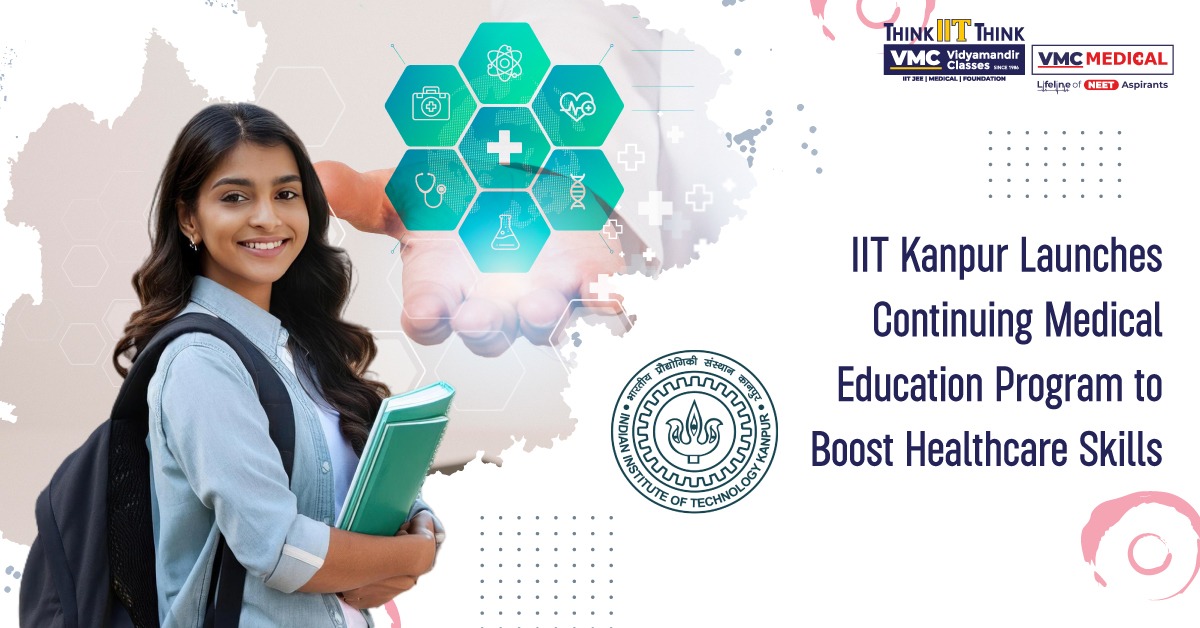IIT Kanpur Launches Continuing Medical Education Program to Boost Healthcare Skills
 Posted On
Posted On
141 total views, 1 views today
In a significant move aimed at advancing the professional capabilities of healthcare personnel, the Indian Institute of Technology (IIT) Kanpur has launched a Continuing Medical Education (CME) Program. This initiative is focused on elevating the skill sets of medical officers and paramedical staff, ensuring they remain at the forefront of medical knowledge and patient care techniques. The program, facilitated by the Health Centre at IIT Kanpur, seeks to strengthen healthcare delivery through specialized training, and practical insights into the latest advancements in the medical field.
CME Program: A Step Towards Professional Excellence
Continuing Medical Education programs are critical for healthcare professionals, as they provide opportunities for constant learning in a field that evolves rapidly. IIT Kanpur’s CME program aims to bridge gaps in knowledge, offer advanced training, and ultimately enhance the quality of patient care. By targeting both medical officers and paramedical staff, the program ensures that the entire healthcare team is equipped with up-to-date skills, fostering a more cohesive and efficient healthcare environment.
The CME initiative at IIT Kanpur includes a series of lectures designed to focus on practical challenges encountered in everyday medical practice. These lectures not only cover common health conditions but also delve into complex medical scenarios, offering a comprehensive learning experience that is valuable for professionals in diverse medical settings.
Key Highlights of the CME Program
One of the standout features of the CME program at IIT Kanpur is the diversity of topics covered. From common illnesses to advanced medical emergencies, the program addresses a wide array of subjects critical to patient care.
- Focus on Kidney Health and Disease Prevention
The program commenced with a lecture by renowned healthcare professionals, who provided valuable insights into the screening and prevention of common kidney diseases. This session emphasized the importance of early detection, patient education, and preventive measures, especially for individuals who are at a higher risk of developing kidney-related issues. The knowledge gained from this lecture can be instrumental in preventing the progression of kidney diseases and minimizing long-term complications. - Tackling Needle Stick Injuries in Clinical Settings
Another pivotal topic covered was needle stick injuries, which are a significant occupational hazard for healthcare workers. During clinical practice, especially in high-pressure environments like hospitals and emergency rooms, needle stick injuries are not uncommon. The session discussed best practices for avoiding such injuries, the latest protective measures, and protocols for managing incidents when they occur. This kind of training is crucial for reducing the risk of infection transmission and enhancing overall workplace safety. - Advancements in Breast Cancer Screening
In the realm of oncology, the CME program featured an in-depth session on breast cancer screening. The lecture highlighted the latest advancements in screening techniques, providing healthcare professionals with updated protocols that can lead to early detection, thereby significantly improving treatment outcomes. Participants gained valuable insights into modern technologies and methodologies used in breast cancer detection, equipping them to better address the needs of their patients. - Managing Pediatric Fever Cases
Pediatric care is a field that requires specialized knowledge, particularly when dealing with febrile conditions. As part of the CME program, healthcare professionals received comprehensive training on managing fevers in pediatric patients. The session focused on both common and complex fever cases, ensuring that medical officers and paramedics are well-prepared to diagnose and treat pediatric fever effectively. This is essential in preventing complications and ensuring prompt treatment for young patients. - Managing Cardiac Emergencies in Primary Care Settings
Primary care providers often encounter cardiac emergencies, and timely intervention can make a significant difference in patient outcomes. The CME program included a session on handling cardiac emergencies within primary care settings, focusing on quick diagnosis, immediate interventions, and when to escalate care to specialized units. This training helps ensure that frontline healthcare workers are equipped to handle such critical situations before the patient is transferred to more advanced care. - Ophthalmic Emergencies and Dermatological Care
The CME program also covered eye emergencies, particularly those that are commonly faced by the IIT Kanpur community. Quick and efficient management of such emergencies is crucial to prevent long-term damage or vision loss. In addition, the program touched on dermatological conditions, offering practical advice on diagnosis and treatment of common skin issues. Dermatology is often overlooked in general medical training, but this program ensures healthcare workers are equipped to handle routine skin conditions effectively.
IIT Kanpur’s Broader Educational Initiatives
Beyond the CME program, IIT Kanpur offers a variety of educational opportunities aimed at fostering professional growth across disciplines. The institute provides continuing and distance education through short-term courses, workshops, online certificate programs, and internships. These programs are designed not only for students and academic staff but also for professionals and individuals seeking to expand their knowledge in specialized fields.
These educational activities fall under the umbrella of IIT Kanpur’s Centre for Continuing Education (CCE). The CCE plays a crucial role in organizing and managing all academic outreach efforts, including conferences, symposia, and training programs. By offering logistical and administrative support, the CCE ensures the smooth operation of these programs while also striving to make them self-sustainable.
The Impact of Continuing Education on Healthcare
Continuing education programs like IIT Kanpur’s CME are essential in the medical field, where new research and technological advancements frequently change the landscape of patient care. For medical professionals, staying updated on the latest practices is crucial for maintaining a high standard of care. IIT Kanpur’s CME program reflects the institute’s commitment to fostering innovation, research, and professional development in healthcare.
In a broader sense, these educational initiatives contribute to the professional growth of healthcare workers, empowering them with the knowledge and skills they need to face modern healthcare challenges. By participating in such programs, medical professionals can provide better patient care, reduce medical errors, and enhance their overall competency in the field.
A Look Ahead: The Future of IIT Kanpur’s CME Program
As IIT Kanpur continues to expand its CME program, future sessions are expected to cover a wider range of topics, including emerging medical technologies, mental health care, and advanced diagnostic techniques. By fostering a culture of continuous learning, the institute aims to strengthen its healthcare infrastructure and set new benchmarks for medical education in India.
The initiative not only benefits the IIT Kanpur community but also contributes to the wider healthcare ecosystem by upskilling healthcare professionals who serve in various capacities. With a focus on self-sustainability, the program is evolving to ensure long-term success and wider accessibility for healthcare workers across the country.




